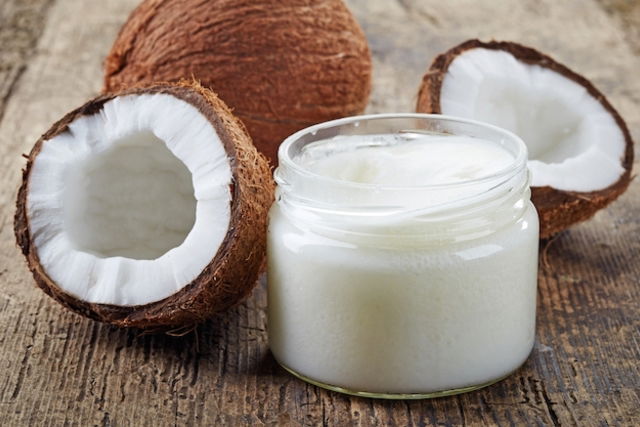Coconut oil contains many bioactive compounds with antioxidant properties, like phenolic acid, medium-chain fatty acids acids. These substances can offer many health benefits, such as reducing cholesterol, regulating blood sugar levels and act as an antiviral and antifungal for various infections.
Coconut oil is a product that can be obtain through dried coconut (or refined coconut) and fresh coconut (or extra virgin coconut). Extra virgin coconut has more health benefits, as it does not undergo processing or high temperatures, and retains more nutrients.
Natural coconut oil is very versatile and can be used in many ways, such as in salad or to prepare recipes. It can also be used to moisturize the face or applied as a hair mask.

The health benefits of coconut oil include:
1. Reduce cholesterol
Coconut oil is rich in fatty acids, like lauric acid and oleic acid. It contains cholesterol-reducing action, which helps to decrease LDL and triglyceride levels. This can play a role in preventing cardiovascular diseases (such as atherosclerosis and heart attack).
2. Combating viral infection
Coconut oil contains medium-chain fatty acids, like lauric acid and its derivative, monolaurin. These acts against viruses by can inactivating viral effects, making it a great option for complementing the treatment of illnesses like measles, vesicular stomatitis and cytomegalovirus.
3. Treating yeast infections
Some studies indicate that coconut oil contains fatty acids with antifungal properties that help to reduce the growth of Candida sp. Coconut oil can be used to complement prescribed treatment of yeast infections.
4. Maintaining healthy skin
Coconut oil contains moisturizing properties due to the presence of fatty acids in its composition. This can help to improve the appearance of dry and rough skin, and can be applied directly to the skin in oil or cream form.
In addition, the antioxidant properties of coconut oil help to delay to appearance of wrinkles and skin flaccidity from aging. Coconut oil can also be indicated to complement the treatment of various skin problems, like psoriasis, dermatitis, eczema and other infections.
5. Managing hair
Coconut oil is one of the best nutrients for hair, as it offers essential protein to nourish the scalp that promotes hair growth. Therefore, coconut oil is used in the industry to manufacture several products, like conditioners, hair serums and hair masks.
6. Helping with weight loss
Some studies indicate that coconut oil can help to contribute to weight loss. It contains medium-chain fatty acids that enter the liver to increase energy production and burning. The energy produced is utilized by the heart and brain, and is not stored in adipose tissue as fat and undergoing fat oxidation. It can also help to reduce hunger, as it helps to keep you full.
However, more studies are needed on the weight loss effects of coconut oil, and therefore consuming large quantities is not recommended, as it high in calories.
7. Helping to regulate blood sugar
The monounsaturated acids and antioxidant compounds present in coconut oil improve beta-cell functioning in the pancreas. These are responsible for releasing insulin into the body. Insulin is a hormone that is necessary for regulating blood sugar levels, and is important for the management of diabetes.
8. Complementing Alzheimer's treatment
The medium-chain fatty acids in coconut oil have the potential to prevent Alzheimer's disease. These fatty acids are easily absorbed and are metabolized in the liver. They are converted into ketone bodies, which can be an alternative energy source that can boost cognitive functioning.
However, more studies are needed to evaluate the effect of coconut oil on Alzheimer's.
Nutritional information
The following table outlines the nutritional information in 100 g and 1 tablespoon of coconut oil.
To obtain all the benefits of coconut oil, it is important to exercise regularly and consume it in small portions within a healthy and balanced diet.
How to use
Coconut oil is commonly utilized in cuisine in many ways: to season salads, vegetables and meat or incorporated into dessert recipes.
To use coconut oil, you can replace the normally used fat (e.g. sunflower oil, butter or olive oil) with extra virgin coconut oil. Like other oils, however, coconut oil is high in calories, and therefore you should not use more than one tablespoon for each meal.
Coconut oil can also be used for cosmetic purposes, such as hair masks. It is often combined with other components, like honey, avocado and olive oil. Due to its moisturizing properties, coconut oil can be used to hydrate the skin. It should be applied directly to the skin in cream or oil form.
Other frequent uses for coconut oil include a lip balm or to prevent stretch marks, as it helps to keep the skin more elastic.
How to make coconut oil at home
Coconut oil can also be prepare at home using the following recipe:
Ingredients:
- 3 cups of coconut water
- 2 brown coconuts, peeled and chopped into pieces
How to prepare:
The first step to making coconut oil is to mix all ingredients in a blender and then strain with a clean cloth. Place the liquid in a capped bottle and store in a dark environment for 48 hours. After this time, you should place the bottle in a fresh environment, protected from direct light, for another 6 hours.
After 6 hours, place the bottle in a refrigerator for 3 hours, for it to solidify. Once solid, you can cut the bottle in the area where the liquid separates from the solid matter, and transfer just the solid part to a recipient with a lid.
Coconut oil is safe for consumption even in liquid form, and does not need to be stored in the fridge.
